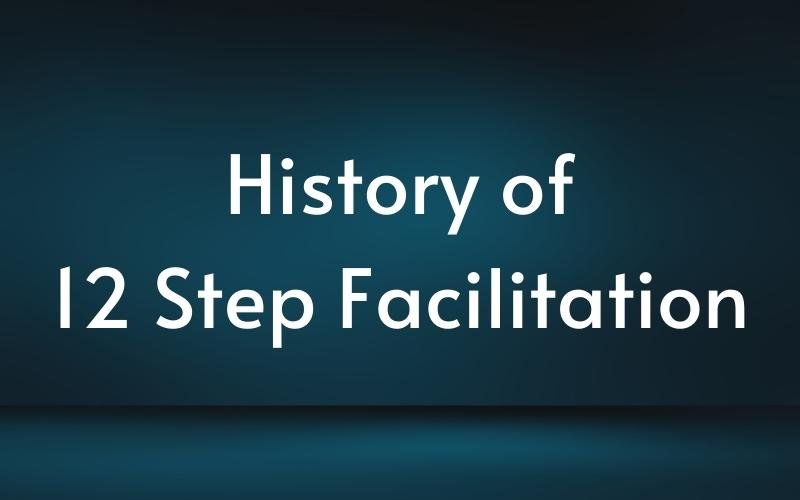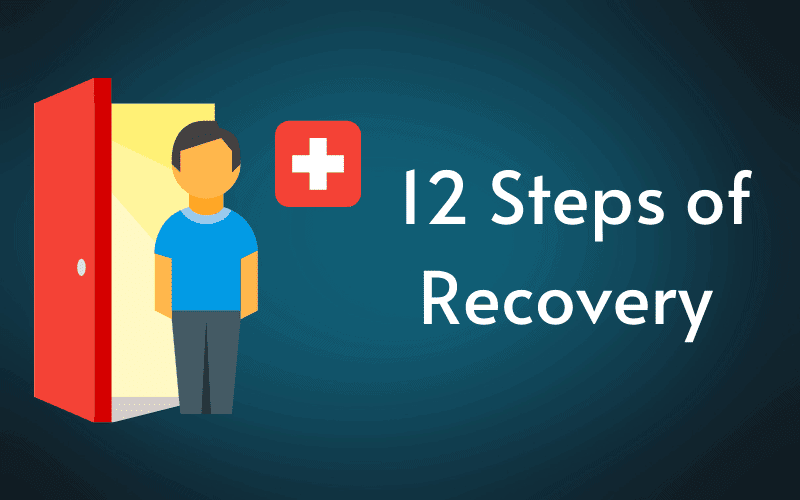What is 12-Step Facilitation?
12-step Facilitation therapy is a technique that helps people to get rid of alcohol and drug addiction by joining and actively participating in a 12-step recovery group. In this process, to avoid addiction, the clients engage themselves in a community that follows a process by helping each other. This is not a personal or individual treatment like CBT (Cognitive Behavioral Therapy) or REBT (Rational Emotive Behavior Therapy).
12-step Facilitation was introduced by Alcoholics Anonymous. After that, it has spread worldwide as one of the most effective treatments of alcohol, drugs, or substance use disorder.
According to a number of researchers, many components of the 12-step Facilitation are effective and efficient to help people get rid of addiction. Components like mutual support, acceptance, honesty, spirituality, etc. have a good impact that helps the clients to avoid addiction in the long run. Being active in the community to help others fight addiction is one of the biggest reasons for which clients don’t go back to the addicted lifestyle.
The main belief the 12-step Facilitation believes is addiction is not something that can be defeated by fighting alone. The guidance and support from all, being accepted by all, inspecting the past errors and regretting those, helping others with a similar problem, etc. help someone to avoid the darkness of addiction.
12-step Facilitation is a lifestyle that promotes healthy and engaging activities. When someone is engaged with a community that is focusing on leaving a healthy lifestyle, going back to the darkness of addiction becomes almost impossible for them.

History of 12-Step Facilitation
According to Wikipedia, the first twelve-step organization is Alcoholics Anonymous, which was founded in 1935 in Akron, Ohio. Two gentlemen called Bill Wilson and Dr. Robert Holbrook Smith started AA, who are known mostly knowns as Bill W. and Dr. Bob.
Though AA started its journey in 1935, the 12 steps of the recovery process were first introduced formally in 1946, after getting proof of the effectiveness of the process on a lot of people. They used to maintain strict privacy and anonymity from the very beginning. While connecting and communicating with general people, they used only their first names to ensure secrecy.
As the organization was growing and the principles were spreading among people, maintaining a strict rule book was necessary. So, AA published their very first rule book called AA Big Book. The principles started being called Twelve Traditions.
It started with AA and with time spread all over the world. Different organizations started to grow up for the fellowship designed for specific issues that can be solved through the 12-step Facilitation. The core structure of the process and belief are similar in those organizations, but the ways of approach and many other things are designed according to the issue itself.
Goals of 12-Step Facilitation
The goal of the 12-step process is very simple and specific.
It focuses on recovering people by taking them through a strictly designed process where they meet a higher and stronger power and a lot of other people. Socialization is a great way of recovering from addiction as one of the primary reasons for addiction is not being accepted by common people or not being social.
While going through the process, people learn to accept their faults and mistakes and take lessons from those.
Overall, we can say that this method is focused to bring a spiritual change in the mind of the patients so that they can leave addiction from the core of their hearts.
Assumptions of 12-Step Facilitation
Just like everything, 12-step Facilitation also depends on some core assumptions. Depending on the assumptions, the treatment process and other things are established. Below are the assumptions of 12-step Facilitation.
- Addiction is a type of illness that is multi-faced. It can be influenced by social, emotional, medical, and spiritual factors.
- Staying away from substances is the main factor that helps to get rid of addiction, but this is not the only one. Emotional and spiritual growth is also a massive factor that makes the recovery process faster.
- Active participation in group meetings helps to gain recovery and stay sober for a long time.
- Effectiveness depends on how much the provider helps to engage with 12-step mutual help establishments.
Issues that can be Solved by 12-Step Facilitation
12-step Facilitation is mainly able to solve addiction.
Drug addiction, alcohol addiction, and substance use disorder are the main things that can be treated with this process. Also, there are many other behavioral disorders for which the 12-step Facilitation process is also effective.
In fact, disorders that are related to the conscious mind of people but who aren’t aware of the disorders can be treated with the help of 12-step Facilitation.

What are the 12 Steps of Recovery according to 12-step Facilitation?
The 12 steps of the 12-step Facilitation are different in different communities but the principles are the same. Below are the basic understandings of the 12 steps of the treatment process.
1. Honesty
Honesty is the very first step of the program. In this step, the addicted person has to honestly admit that he/she is really helpless and weak against alcohol or the drug to which he/she is addicted. The honest acceptance of this true fact helps people to crave the fight against addiction.
2. Faith
When the fact of weakness is honestly accepted, it is common that the person will be hopeless. In that situation, he/she should have faith in a power that is higher or stronger than addiction. He/she must put trust and believe that the stronger power can help to heal.
3. Surrender
When faith in the stronger power is established, now it is time to surrender to the power. The person alone can’t fight against the addiction. He/she has to surrender to get help from the power that can help fight addiction and win against it.
4. Soul Searching
Now it is time to get some fuel. The fuel comes from the understanding of the situation. He/she has to recognize the problems and understand how addiction and its consequences have affected him/her and the people around her. It helps to gain mental strength that helps to fight addiction.
5. Integrity
This step is the step to talk about mistakes and wrongs. After understanding the mistakes and situation, now it is time to admit the mistakes and wrong actions in front of the higher power. Besides the higher power, another person is also included in the mistake admitting process.
6. Acceptance
This step is all about accepting the truth. In this step, the person accepts the faults, mistakes, and character defects without being hesitant. Acceptance helps him/her to determine the fact that the faults and defects are not good and should be removed from life. This step makes him/her willing to let the faults and defects go.
7. Humility
This can be the toughest step of the 12 steps for someone. However, in this step, the person asks the higher power to remove the shortcomings he/she has. This can be done in many ways. The way is chosen according to the will of the higher power.
8. Willingness
In this step, the person should be willing to make amend for the wrong things he/she has done. For this, he/she makes a list of the wrong things done with people around. It is not always about the wrong actions, it is also about wrong beliefs and thoughts about people.
9. Forgiveness
Another tough step of the process is asking for forgiveness from the people on the list which is made in the previous list. Making amends is not easy for all. But it heals like magic in maximum cases. So, a person who is serious about recovery should make amends and ask for forgiveness. But in case it hurts a particular person, it should be avoided or done in any other way.
10. Maintenance
Continuously admitting the wrongs and asking for forgiveness helps people to change. That’s why the practice should be maintained. Admitting continuously after being wrong is something that nobody wants. That’s why they start avoiding mistakes and turn into a better person gradually. So, this is an important step where the person willingly and consciously changes himself/herself.
11. Making Contact
This step is all about being connected with the higher power and gradually seeking enlightenment. Through the connection that is gradually improving, the person seeks the plan that the higher power has for him/her. Being connected to the higher power makes them understand life and its important components more clearly.
12. Service
This is the final step that is never-ending and helps the person to stay out of addiction for the rest of his/her life. In this step, he/she has to convey the message to other people who are seeking freedom from the darkness of addiction. By helping others and practicing the steps, the person contributes to the wellness of others which helps them to turn themselves into a better person.
These are the core beliefs 12 steps of the 12-step facilitation program. Obviously, with the change of time and place, the ways how the steps work have gained a lot of variations, but the core beliefs are always the same.

12 Step Facilitation Group Ideas
The groups in 12-step Facilitation work to develop mutual connection and relation of help, motivation, and support. Social support is the principle of the groups that work as the main support that someone needs while struggling with addiction.
Groups often consist of both users and non-users of alcohol and other substances.
The groups sit together for meeting regularly and talk about the issues they’re facing, the ways they’re using to fight those, and many other aspects related to recovery life as well as daily life. This helps people to understand that the struggle is real in every case and that to recover from addiction, struggling is a must.
The groups also help to increase social networks. As a result, for any kind of support, a person can seek help. It can be emotional or mental support, help in something, sharing knowledge, or anything. When there are so many people ready to support, people feel confident and strong. This helps in the recovery process too.
Adding a close person to the group increases the chance of the group work being more effective for a person. This is a way to make the recovery process faster and last the sober stage for a longer time.
Overall, the groups provide mental, emotional as well as physical support to the members. People can understand that they’re not alone in the journey towards a healthy lifestyle. This feeling helps them to run towards a faster and firmer recovery which everyone wants.
How Long does 12-Step Facilitation Program Take?
Typically, 12-step facilitation is a long-term process. Even after you successfully recover from addiction, you’ll have to stay attached to the program to get the maximum out of it.
The 12-step program contains a lot of group sessions. Typically the session duration is at least 2 hours. Also, to properly recover, you’ll have to continue participating in the sessions for at least a year. Also, the duration needed depends on a lot of things like your acceptance of the spiritual approach, being able to admit your faults, and so on.
So, it is not easy to say how long the program takes to recover people from drug, alcohol, or substance use disorder. It depends on a lot of things. But an assumption is- a person has to participate in the group meetings for at least a year to ensure that the process has become effective.
Does the 12-Step Program Really Work?
There was too much controversy about the effectiveness of 12-step Facilitation because this is not a scientific method or is not backed by any scientific evidence. So, being confused about the effectiveness of such an intense program that was spreading fast was very common. That’s why a lot of researchers have conducted a number of studies to check it this program really works or not.
Researching the members of 12-step Facilitation is a bit tough because the members are anonymous. However, still, there were many pieces of research about its effectiveness of it and the results are pretty satisfactory.
According to a survey conducted by Alcoholics Anonymous has shown that on average, members who have participated in the 12-step Facilitation program and completed it properly tends to lead sober life for around 9-10 years. The survey was done on 6000 members of AA. In spite of the self-report biases, the result is trusted because the scientific research conducted has also shown almost similar results.
According to research done by Dr. Kelley conducted on 160 teens from California, teens who have joined meetings for 6-12 months after treatment are more likely to stay sober and safe from addiction for up to 8 years. The teens were from a few different rehab centers. The research was conducted for 8 years.
According to another research by Ouimette et al. in 1998, it is found that people who have gone through professional treatment along with 12-step facilitation are more likely to get the best positive outcome.
So, if the question is about the effectiveness of the 12-step program, the answer is- Yes. But it is not similarly effective always. For many people, it doesn’t work that effectively. There are some reasons too. Below are the reasons for which 12-step Facilitation doesn’t work for all.
Why 12-step Facilitation doesn’t Work for All?
Just like all other treatments, there is a chance that 12-step Facilitation won’t work for some individuals. There are some specific reasons from which anyone or more than one reason can be responsible for this. Let’s check those reasons.
Faith
The main principle of the 12-step Facilitation program is putting faith in a higher power. In most cases, the power is God. This is contradictory to the faith of people from another religion or non-religious people. Again, if the power is something else, people who believe in one creator might find it contradictory.
To get the benefit of 12-step Facilitation, the clients have to open their minds to accept the superiority of one power. If anyone doesn’t do this from the core of the heart, the treatment fails to help him/her get rid of addiction.
Safety
Though one of the core principles of 12-step Facilitation is accepting everyone, anyone can find the environment unsafe. For example, a woman can find it uncomfortable to attend a group where everyone else is male. Again, someone from the LGBTQ community may find it unsafe to attend sessions where others are not that welcoming to such groups. Similar things can be happened because of cultural differences, nationality, or religion.
Being worried about safety won’t make anyone able to receive the effectiveness of 12-step Facilitation. This can be another reason for the ineffectiveness.
Underlying Issues
12-step Facilitation doesn’t work properly when there is an underlying issue that is driving the person towards addiction. The reason is- it focuses on addiction only, not on the reasons behind addiction. There could be many reasons behind addiction like mental health issues, physical health issues, trauma, etc.
In such cases, unless the issues are solved, the program can’t be as effective as expected. As a result, the person can get addicted again within a short period of time.
Personal Circumstances
There might be a lot of personal circumstances which can stop a person from joining a meeting, keeping the focus on a meeting, or properly understanding the core of the meeting. Because of lack of concentration, the program doesn’t break into the mind and gain the expected result.
Any type of personal circumstances can affect the effectiveness of 12-step Facilitation. The person has to be strong enough to avoid those. Otherwise, you know what will happen.
Lack of Structure
12-step Facilitation may provide a routine or structure of passing a small amount of time every day or every week. But it doesn’t help a person to bring structure to his/her daily life. Other common treatment processes provide a structure that should be followed.
The lack of structure drives people to addiction again if they can’t come back to their regular life quickly. The time they’ve to spend without any work seems painful. To get rid of such a monotonous situation, they again become dependent on drugs, alcohol, or other substances that should be avoided.
Though 12-step Facilitation can’t recover everyone doesn’t mean that it is not an effective treatment. You can still depend on it because it has a good rate of helping people with addiction.
Also, if someone is not recovered after going through this process doesn’t mean that no other treatment can do that.

Pros and Cons of 12-step Facilitation
This is a therapy and it should have some pros as well as cons. Arguments have provided a lot of pros of this therapy, and there are also many factors that are against its effectiveness. When choosing it as a therapy or just learning about it, you should know the pros and cons of both.
Pros
- The therapy provides the scope of being a part of a large community that is made to support and help.
- Participating in the group meetings brings confidence that helps to be social with regular life again.
- Through the activities of the group, the person grows a sense of belongingness. It is important for growing self-esteem.
- Anyone can be a part of the 12-step program for a very low or sometimes no cost.
- 12-step Facilitation has a record and evidence of being effective and keeping people sober for a long time.
- This program helps to understand the issues and makes the patients agree to those. When the issues are accepted, it becomes easier to work on them.
- 12-step Facilitation has a strong and huge community of people who are willing to help others with any issues.
Cons
- 12-step Facilitation ignores the physical or social issues that can be a reason behind addiction.
- Introverted people are normally uncomfortable in groups and social involvements. This is a con, but it is possible to make them comfortable gradually.
- Confessing own issues and mistakes in front of the public is not easy for all. Many people feel shy, confused, and uncomfortable doing this. Everything can’t be said in public.
- It is kind of shifting the dependency. People dependent on drug gradually becomes dependent on the community. This system lacks a way of making people self-dependent.
- The primary belief of 12-step Facilitation is the addicted person has no power over drugs or addictive substances.
- The sessions or meetings of 12-step Facilitation are very long. So, it takes a lot of time if you include the time you need to prepare and travel to the meeting.
Though there are a lot of cons, 12-step Facilitation has evidence that it has a great impact on addicted people. The success rate and duration of sobriety are proven to be better than many other treatments. So, it still has a great acceptance for recovering from drug or alcohol abuse or substance use disorder.
I hope this article has helped you to know something about 12-step facilitation. This is a great way of avoiding addiction if someone is open to spiritual change, accepting faults, and changing behavior. Its effectiveness is slow but it ensures long-term sobriety.






